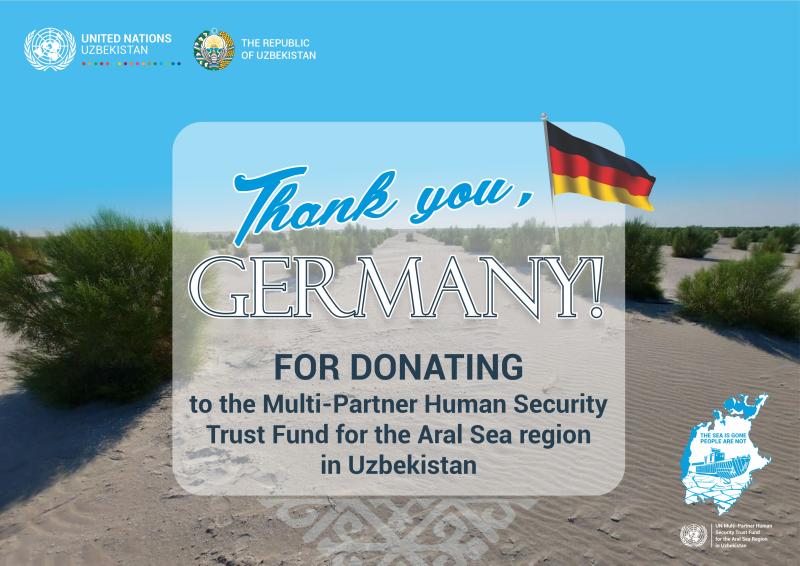

TASHKENT, Uzbekistan, 16 December 2022 – In the framework of its International Climate Initiative, the Government of the Federal Republic of Germany, a key contributor to climate-related United Nations Multi-Partner Trust Funds, has made a €700,000 contribution to the Aral Sea Fund (currently known as the Multi-Partner Human Security Trust Fund for the Aral Sea Region in Uzbekistan).
As an earmarked allocation, the German contribution will serve to specifically support reducing stress on local communities caused by the deteriorating environmental situation, being the first outcome of the UN Multi-Partner Human Security Trust Fund for the Aral Sea Region in Uzbekistan (MPHSTF) programmatic framework.
German Ambassador to Uzbekistan Dr. Tilo Klinner states that: “The people and government of the Federal Republic of Germany are pleased to offer financial support needed to address the most pressing concerns of communities tied to the Aral Sea. Advancements in this priority area will benefit not just Uzbekistan’s citizens, especially women and children, but also those of other Central Asian nations and will indeed have positive impacts on a global scale. The contribution to the Aral Sea Fund is furthermore an example of Germany´s new foreign climate policy, which puts climate-induced threats to human security at its centre.”
The ecologically-sustainable economic development of the Aral Sea Region, through infrastructure development, innovation promotion and regional cooperation, is an outcome the Government of the Federal Republic of Germany supports as a means of addressing climate change impacts in Central Asia. Germany recognizes that the Aral Sea crisis has been an acute challenge in western Uzbekistan, with environmental and human ramifications beyond national and regional borders. The sea’s progressive shrinking has profoundly influenced its surrounding region’s environment, economy and ecology. A direct consequence of its drying out has been dramatic climate change felt not only in Central Asia but also far beyond.
By virtue of its contribution to the Aral Sea Fund, Germany has multiplied efforts of national and local development partners, participating UN Organizations, NGOs, CSOs and academia, in continuing to make positive changes in the lives of people of Aral Sea communities. Through joint programmes and with funding support from Germany alongside existing partners, development stakeholders in the Aral Sea Region can address food, economic, social, health and environmental challenges through the approach of ‘leaving no one behind’ - reaching vulnerable groups including children, youth, women, and the elderly.
The United Nations in Uzbekistan acknowledges the key support of the Government of the Federal Republic of Germany for achieving the Aral Sea Region’s sustainable development. Ms. Consuelo Vidal, the new United Nations Resident Coordinator, ad interim, for Uzbekistan welcomes the generous gesture of Germany and states that: “The UN Country Team in Uzbekistan is grateful for its continued partnership with the Government of the Federal Republic of Germany. As I begin my tenure in Uzbekistan, I will seek to ensure this contribution benefits the people of Karakalpakstan through climate-related interventions. The UN family in Uzbekistan recognizes that as an earmarked contribution to a pooled fund, Germany’s support will be co-mingled with contributions from the governments of Uzbekistan, Norway, Finland, the Republic of Korea and the European Union, the Alwaleed Philanthropies, and future contributing partners, to achieve a greater impact for people affected by the Aral Sea crisis.”
Originally published on aral.mptf.uz